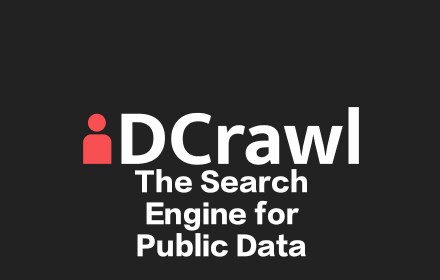Tech
IdCrawl: The Search Engine for Public Data

In today’s digital age, information is power, and IdCrawl stands out as a potent tool that leverages the vast expanse of the internet to collect and organize public data about individuals. Whether you are a researcher, a business professional, or someone curious about digital footprints, IdCrawl offers a gateway to discovering what’s out there about almost anyone.
What is IdCrawl?
IdCrawl is an online service designed to aggregate and present publicly available information about individuals from various online platforms. This includes social media profiles, blog posts, news articles, and other web content. Unlike traditional search engines like Google, which provide a broad spectrum of results, IdCrawl focuses on personal information, making it easier to locate data related specifically to people.
How Does IdCrawl Work?
The underlying mechanism of IdCrawl involves web crawling, where automated bots scour the internet for specific data. These bots extract information from social media sites like Facebook, Twitter, LinkedIn, Instagram, and other web resources. This data is then compiled into comprehensive profiles, allowing users to access consolidated information about individuals.
The interface of IdCrawl is user-friendly. By simply entering a person’s name into the search bar, users can retrieve a list of results, including social media accounts, photos, contact information, and even professional details. The accuracy and depth of information can vary, depending on how much an individual has shared online and the privacy settings of the platforms they use.
Applications of IdCrawl
- Background Checks: One of the primary uses of IdCrawl is for conducting background checks. Employers, landlords, and even individuals can use it to gather more information about potential employees, tenants, or acquaintances. This can help in verifying identities and assessing the credibility of individuals.
- Research and Journalism: Researchers and journalists often need to gather comprehensive data about people for their work. IdCrawl can be an invaluable resource, providing a starting point for deeper investigations and background research.
- Personal Branding: For those interested in managing their online reputation, IdCrawl offers a way to see how they appear to the public. By understanding what information is easily accessible, individuals can take steps to manage their digital presence better.
- Networking and Recruitment: Professionals in fields like recruitment and sales can use IdCrawl to find potential candidates or leads. By accessing detailed profiles, they can tailor their approaches more effectively.
Privacy Concerns and Ethical Considerations
While IdCrawl can be incredibly useful, it also raises significant privacy and ethical concerns. The aggregation of public data into easily accessible profiles can be seen as invasive. People often underestimate how much information they share online and how it can be used.
- Privacy: Individuals may not be aware that their public posts, photos, and professional details are being compiled into profiles that others can access. This could lead to unwanted attention or misuse of information.
- Ethics of Use: The ethical implications of using such a tool are complex. While it can be argued that IdCrawl only aggregates publicly available information, the ease with which this data can be accessed and used for various purposes can lead to ethical dilemmas. Users must consider the potential impacts on the privacy and rights of the individuals they are searching for.
- Data Accuracy and Security: The accuracy of the data compiled by IdCrawl is another concern. Misinformation or outdated information can lead to wrong conclusions and decisions. Furthermore, the security of the data stored and accessed through IdCrawl is crucial to prevent misuse and breaches.
Managing Your Digital Footprint
Given the reach of tools like IdCrawl, managing your digital footprint is more important than ever. Here are a few steps you can take:
- Review Privacy Settings: Regularly check and update the privacy settings on your social media accounts to control what information is publicly accessible.
- Think Before You Post: Be mindful of the information you share online. Consider how it might be perceived and used by others.
- Search Yourself: Use IdCrawl and similar tools to see what information is available about you online. This can help you identify any inaccuracies or unwanted information.
- Professional Help: For a more thorough management of your online reputation, consider seeking professional help from services that specialize in digital footprint management.
Conclusion
IdCrawl is a powerful tool in the realm of public data aggregation, offering both benefits and challenges. While it provides valuable insights and conveniences, it also underscores the importance of digital privacy and ethical use of information. By staying informed and proactive about managing your online presence, you can navigate the complexities of the digital age more effectively. Enjoy Hint Today.